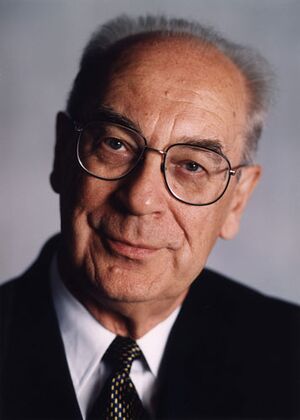Difference between revisions of "Yuli Vorontsov"
m (Text replacement - "|twitter= " to "") |
(unstub) |
||
| Line 1: | Line 1: | ||
{{person | {{person | ||
|wikipedia=https://en.wikipedia.org/wiki/Yuli_Vorontsov | |wikipedia=https://en.wikipedia.org/wiki/Yuli_Vorontsov | ||
| − | |image= | + | |image=Vorontsov 1.jpg |
| − | |birth_date= | + | |birth_date=October 7, 1929 |
| − | |death_date= | + | |birth_place=Leningrad |
| + | |description=Soviet and Russian diplomat, including Ambassador to the United States. | ||
| + | |death_date=December 12, 2007 | ||
| + | |death_place=Moscow | ||
|constitutes=diplomat | |constitutes=diplomat | ||
|employment={{job | |employment={{job | ||
| − | |title=Ambassador | + | |title=Russia/Ambassador/United States |
| + | |start=1994 | ||
| + | |end=1998 | ||
| + | }}{{job | ||
| + | |title=Russia/Ambassador/United Nations | ||
|start=26 December 1991 | |start=26 December 1991 | ||
|end=7 July 1994 | |end=7 July 1994 | ||
}} | }} | ||
}} | }} | ||
| + | '''Yuli Mikhailovich Vorontsov''' (also '''Yuliy Vorontsov''') was a [[Soviet Union|Soviet]] and [[Russia|Russian]] diplomat, President of International Centre of the Roerichs ([[Moscow]]).<ref name="NYTobit"/> In the mid-1970s he was Chargé d'Affaires at the Soviet embassy in Washington under Ambassador [[Anatoly Dobrynin|Dobrynin]].<ref name="NYTobit">https://www.nytimes.com/2007/12/15/world/asia/15vorontsov.html</ref> He was then Ambassador to [[India]] (1978-1983) and France (1983-1986). He returned to Moscow to be the first deputy foreign minister (1986-1990) and participated in arms reduction talks with the United States.<ref name="NYTobit"/> In 1988-1989, he was simultaneously the [[List of ambassadors of Russia and the Soviet Union to Afghanistan|Ambassador to Afghanistan]] as Soviet troops [[Soviet withdrawal from Afghanistan|withdrew from the country]].<ref name="NYTobit"/> He then served as the last [[Permanent Representative of Russia to the United Nations|Soviet ambassador to United Nations]] between 1990 and 1991 and as the first Russian Permanent Representative to the UN from 1991 to 1994.<ref name="NYTobit"/> After this he served as the [[List of ambassadors of Russia to the United States|Russian ambassador to the United States]] from 1994 to 1998.<ref name="NYTobit"/> In 2000 Vorontsov was chosen as the high-level coordinator for issues related to a paragraph of [[United Nations Security Council Resolution 1284]] which once again required Iraq to face "its obligations regarding the repatriation or return of all Kuwaiti and third country nationals or their remains, [and] the return of all Kuwaiti property [...] seized by Iraq" (during the [[1990 Gulf War|invasion of Kuwait]]).<ref>https://www.un.org/News/Press/docs/2000/20000214.sga723.doc.html</ref> | ||
{{SMWDocs}} | {{SMWDocs}} | ||
==References== | ==References== | ||
{{reflist}} | {{reflist}} | ||
| − | |||
Revision as of 01:28, 9 March 2022
(diplomat) | |
|---|---|
 | |
| Born | October 7, 1929 Leningrad |
| Died | December 12, 2007 (Age 78) Moscow |
Yuli Mikhailovich Vorontsov (also Yuliy Vorontsov) was a Soviet and Russian diplomat, President of International Centre of the Roerichs (Moscow).[1] In the mid-1970s he was Chargé d'Affaires at the Soviet embassy in Washington under Ambassador Dobrynin.[1] He was then Ambassador to India (1978-1983) and France (1983-1986). He returned to Moscow to be the first deputy foreign minister (1986-1990) and participated in arms reduction talks with the United States.[1] In 1988-1989, he was simultaneously the Ambassador to Afghanistan as Soviet troops withdrew from the country.[1] He then served as the last Soviet ambassador to United Nations between 1990 and 1991 and as the first Russian Permanent Representative to the UN from 1991 to 1994.[1] After this he served as the Russian ambassador to the United States from 1994 to 1998.[1] In 2000 Vorontsov was chosen as the high-level coordinator for issues related to a paragraph of United Nations Security Council Resolution 1284 which once again required Iraq to face "its obligations regarding the repatriation or return of all Kuwaiti and third country nationals or their remains, [and] the return of all Kuwaiti property [...] seized by Iraq" (during the invasion of Kuwait).[2]